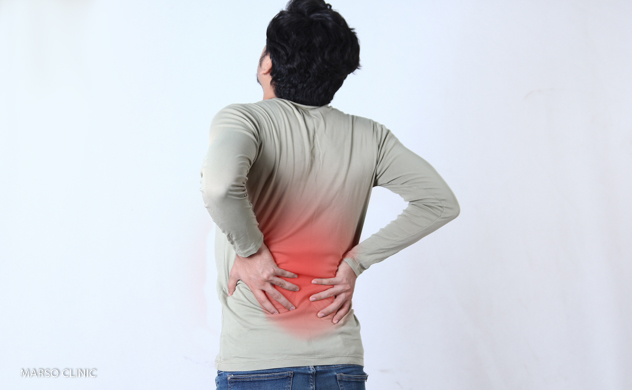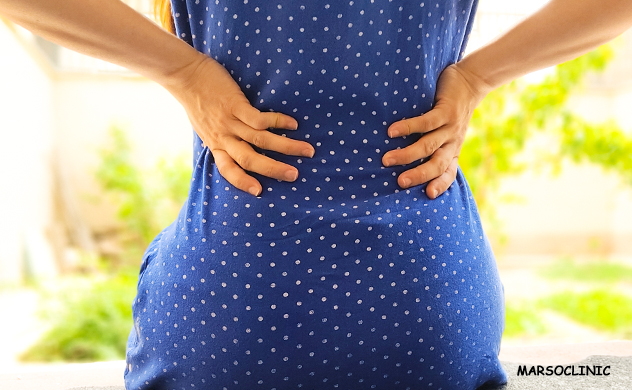upper back pain when breathing and moving

If you have pain in the upper part of your spine that gets worse as you breathe or move, read on. Pulmonary embolism can also cause pain in the upper back, which intensifies during breathing, especially deep breathing.
Pulmonary embolism requires urgent action and prompt medical intervention, and may also be a source of danger to your heart.
In the following We are talking more about
Upper back pain when breathing and moving
Why do I have high back pain when I breathe?
Causes of upper back pain that begins or intensifies with breathing
When to see a doctor?
Why do I have high back pain when I breathe?

This synchronicity is due to the fact that your spine and vertebrae are connected to the ribs of your chest, so the dilation of the lungs during the breath, which is accompanied by a change in the position of your ribs, is transmitted through this connection to the vertebrae above your back. Spasm of the muscles of the back or herniated disc between the vertebrae located in the upper parts of your spine aggravates your pain.
Causes of upper back pain that begins or intensifies with breathing
- May be a warning to alert you to a heart attack:
Upper back pain can be a sign of heart problems, so be aware that if your upper back pain gets worse with breathing and you have one or more of the following symptoms, you should call the emergency room right away:
- Cold sweat
- nausea and vomiting
- Shortness of breath
- Feeling of pressure and heaviness on the chest
- Chest burning sensation Increased heart rate
Women are more at risk than men for feeling the pain of a heart attack in the upper back or in the jaw, and sometimes this pain is just a warning sign of a heart attack.
Angina is a problem that occurs due to insufficient blood supply to the heart muscle cells.
If the blood vessels in your heart muscle, called coronary arteries, become narrow or blocked, you may develop angina, especially during exercise.
Angina is just like the pain of a heart attack and can be felt from the top of your navel to your jaw in any part in this area.
Women feel angina more than their chest, back, neck, jaw, arm and upper abdomen.
During this pain you may also experience the following manifestations:
- Fatigue
- Shortness of breath
- Lightheadedness
- sweat
- Nausea
When the layers in your chest are inflamed, there is pain when you breathe in the chest, which is called pleurisy and sometimes spreads to the top of your back. The causes of these inflammations are:
Inflammations and infections of the lung tissue
Viral and bacterial pneumonias
Primary and metastatic lung tumors, especially types of tumors located in the lung environment
Autoimmune diseases such as lupus and rheumatoid arthritis, etc.
Pain in these conditions may be accompanied by the following symptoms: Frequent cough, fever, chills, unexplained weight loss, shortness of breath.
Doctors call the return of stomach acid to the esophagus, GERD. The return of stomach acid to the esophagus can cause burning and even chest pain. This pain is felt right behind the sternum, but sometimes the pain may be felt in your upper back if added. You weigh if you have persistent sputum in the back of your throat.
If you get heartburn while eating, if you have a chronic cough, your back pain, which is aggravated by breathing and sometimes movement, may be due to GERD.
Pain due to inflammation of the gallbladder or bile ducts due to the presence of gallstones has a range of the following symptoms:
Pain in the upper right side of the abdomen that shoots between the two shoulders and the right shoulder
The pain starts with eating heavy food and sometimes drinking alcohol
In chronic cases, the pain is transient and resolves after a few hours, but in acute cases, the pain becomes much more severe, abdominal pain and sometimes lower chest pain are added to the clinical manifestations, the person experiences fever and chills and nausea and vomiting.
Inflammation of pancreatic tissue, often caused by leakage of digestive enzymes produced inside the pancreas.
Gallstones are the most common cause of acute pancreatitis, and in communities where drinking alcohol is common, alcohol can cause pancreatitis attacks.
Symptoms of acute pancreatitis:
- Sharp chest pain that gets worse with breathing
- Upper and left abdominal pain that is exacerbated by lying down and deep breathing
- Radicular pain in the left shoulder, back and neck
- Vascular events such as aortic aneurysm and aortic dissection:
When the inner layer of the body's main artery, the aorta, becomes weak and tearing from the weak area, aortic aneurysm occurs, these events lead to a very life-threatening dissection of the aorta, accompanied by a sharp, sudden pain in the chest that can spread to the back.
Doctors call the increase in the inner diameter of a part of the aortic artery, aortic aneurysm, which if the passage of time and rupture of the dilated site, the death of the affected person will not be far from conceivable.
Chest pain caused by dissection and aortic aneurysm inside the chest is more likely to spread to the back.
Primary tumors of lung origin, especially those that grow in the periphery of the lungs, such as lung adenocarcinoma, and tumors that follow the metastasis of cancers to other organs in the lung and they are in the margins of the lungs and can cause pain in your upper back that is exacerbated by changing position and moving and breathing deeply.
- Musculoskeletal problems:
If you have exercise that repeatedly uses the muscles of your upper back, shoulders, and shoulders, back pain that is exacerbated by movement or deep breathing can result from stretching and spasm of the muscles in this area that have been repeatedly overused.
This pain can be accompanied by:
- Fatigue
- Muscle stiffness
- Muscle twitching
- Occur
These pains occur frequently in rowers who are constantly rowing, plowing and shoveling the ground, snow shoveling, playing tennis, golf and gymnastics.
Back pain that is exacerbated by movement and breathing, and can sometimes be accompanied by muscle spasms and cramps, may be due to pinched nerves in the upper parts of your spine and even your shoulders. These pains may be in the chest and even above your arms and shoulders
The next case is an intervertebral disc herniation above your spine, during which the protruding disc puts pressure on the nerve roots coming out of the spine, causing back pain and sometimes chest pain during deep breathing.
When to see a doctor?
If you have upper back pain that intensifies when you move and change position or when you breathe deeply, it is necessary to go to a well-equipped medical center in the following cases:
- If there is shortness of breath
- If you have a fever or chills
- If there is nausea or vomiting
- In case of unusual fatigue
- In case of cold sweating
- If the heart rate increases or the heartbeat becomes irregular
- If there is a cough soaked in blood
- In case of unreasonable weight loss
- If you have a history of other cancers
- In case of lightheadedness
- If the number of breaths increases
The final words:
We remind you that in order to diagnose the cause, history, examination and hearing of heart and lung sounds, taking ECG, sometimes MRI, ECG, etc. are necessary.
Treatment will depend entirely on the cause of your upper back pain. In the event of a heart attack or pulmonary embolism, emergency treatment is necessary and wasting time may result in death.